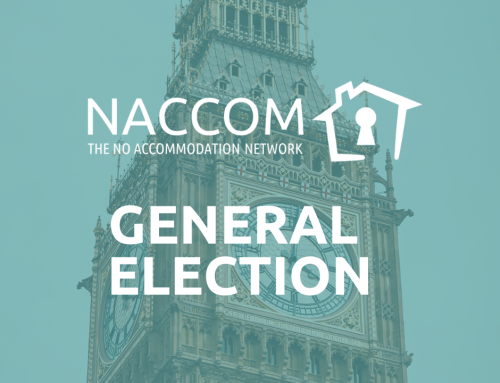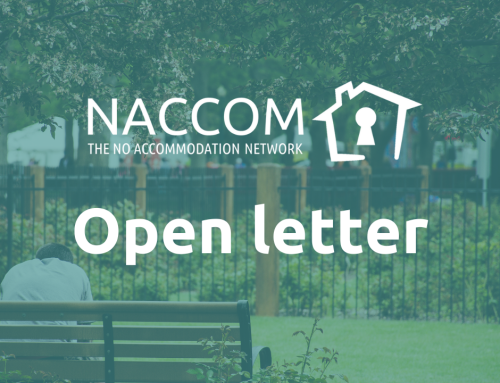These bi-annual events form an important part of our membership network, providing a safe space for members old and new to connect. The hubs are also a valuable opportunity for the NACCOM team to understand emerging trends, challenges and opportunities in the sector relating to frontline accommodation and support provision, which help to shape our work both in the short- and long-term.
Our most recent regional member hub meetings were in July and August of this year, and were attended by 73 people across the following regions;
- The Midlands
- Yorkshire and Humberside
- Scotland, Northern Ireland and the North East
- The North West
- Wales
- London, South East, South West and East of England
Whilst there are always unique trends, challenges and opportunities specific to each region of the UK, there was huge commonality this summer across the board as to what NACCOM members were seeing, hearing and experiencing on the ground. Some of the most common challenges facing all members were:
➡️ Delays to Home Office decisions, as well as delays to accessing NASS accommodation even after it has been granted, which impact individuals waiting for decisions but also organisations supporting them, who are needing to provide that support for longer while these decisions are made.
➡️ Inadequate and inconsistent access to decent and affordable accommodation, both for emergency provision and particularly for move on, and to legal advice and advocacy.
➡️ The impact of cost-of-living increases – both for organisations themselves and for the individuals they work with.
➡️ The impact on staff of working in a uniquely challenging sector within a highly polarised political environment, whilst potentially facing their own individual financial difficulties.
We also had a number of members across the regional hub meetings who deliver hosting projects. A few of these members are supporting people through the Homes for Ukraine scheme. Regardless of their involvement with the scheme, all reported ‘losing’ hosts from their regular hosting project to Homes for Ukraine and their long-term concerns for how to ensure that the hosting accommodation model is not lost for people in the asylum and immigration system with no other options.
Opportunities were also discussed at the regional hubs, and two key trends across the meetings were:
➡️ Opportunities to partner with other voluntary and statutory organisations to end destitution. These partnership opportunities are coming from a mix of learning from Covid-19 provision through to partnering with the local authority to deliver their Homes for Ukraine or Rough Sleeper Initiative response, through to needing to work in a different, more targeted or collaborative ways due to funding and cost of living constraints.
➡️ Many members also noted an increased awareness of the needs of refugees and people seeking asylum, and of their organisations, through wide-ranging communication campaigns like Together with Refugees, Homes for Ukraine and Stop Rwanda.
Other areas of interest that came up consistently at the summer regional hub meetings:
➡️ NACCOM members are increasingly working with people with complex health/mental health needs and finding challenges accessing support for this.
➡️ Many accommodation providers continue to raise concerns around low referral rates. This seems to be due to a number of factors, including referral partner drop-ins not re-opening post-pandemic and some people still being accommodated under Covid-19 emergency provision. Some members who were raising concerns about this earlier in the year have noted that their referrals are starting to increase again.
➡️ There is a lot of demand on frontline staff to constantly upskill themselves in relation to new requirements and opportunities (like the move to a full-dispersal model for asylum support and the passing of the Nationalities and Borders Act) and pivoting from one crisis to another (for example, responding at pace to crises in Afghanistan, Ukraine and the plan to offshore people to Rwanda). This feels unsustainable.
➡️ Funding – particularly for smaller organisations – is a constant challenge to secure and maintain, though some members noted that partnerships with Local Authorities and opportunities through Homes for Ukraine (for example to deliver training) have presented new funding avenues.
Whilst the challenges for frontline organisations working with people experiencing destitution in the asylum and immigration system can often seem overwhelming, coming together in our Regional Hub meetings is also a positive, affirming experience. We are grateful for the solidarity and expertise of our members, whose resolve to end destitution fuels our core remit as a charity.
*Our Regional Hubs are as follows. For practical and logistical reasons we sometimes merge and change regions for the purposes of bringing members together for meetings. We also occasionally split some of our hubs into more focused sub regional calls, for example gathering members in Scotland together.
- The Midlands
- Yorkshire and Humberside
- The North East and Scotland
- The North West and Northern Ireland
- Wales
- London, the South East, South West and East of England




